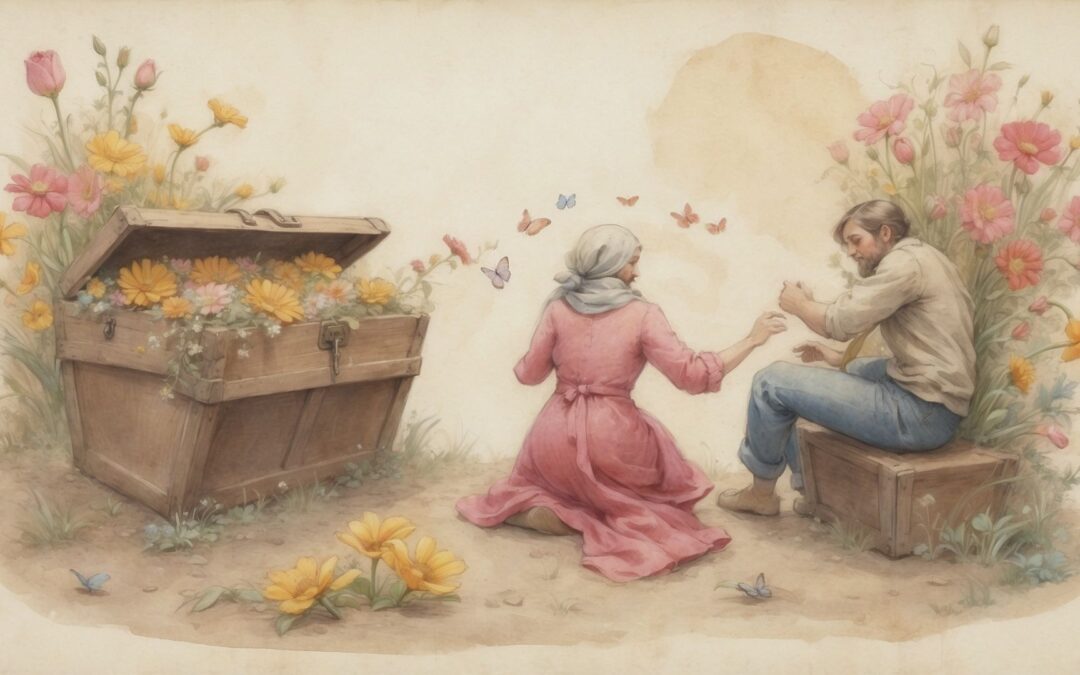Practice Worksheet
Transcript
Disclaimer
I am using an automatic transcript service as it is not possible for me to do it on my own and I cannot afford human transcription at the moment. The service claims to have about 95% accuracy, which means there will still be some mistakes, so my apologies for having a less than perfect transcript, but I hope I can afford human transcription soon and I will solve this problem. However, the service is pretty good, and the transcript is almost perfect.
Transcript
Welcome to a new episode from English plus podcast. And today’s episode is about stories. And the story we have for today is the necklace by Guy De Maupassant. What we will try to do in stories is to dig a little bit deeper. Of course, the main thing is for you to enjoy a good story. That’s what I really want to do.
[00:00:27] That’s what I really want to get from this episode. But we may dig a little bit deeper using some literary devices and that will make our understanding of the language much stronger. And our reading will become a lot better. But before we start with the episode today, let me remind you that you can find the transcript of this episode in a link.
[00:00:46] I will leave in the description and you can become a patron of our show on Patrion. You will also find that link in the description and by becoming a patron of the show, you will get a PDF worksheet. With every single episode we release that being said, let’s start with the necklace by D Duma person.
[00:01:06] The question that is asked in the story is how important is status now? What happens to people who place too much importance on status or the standing they have in a group in the necklace you will meet. Madame was an unforgettable character whose pursuit of status costs her more than she could ever have imagined.
[00:01:28] Now, before I start reading the story to you, I’m going to stop here and there in the story and pose a question to you. And I’m not going to give you the answer for that. These questions are meant to help you think about the story while you’re reading it. And in this case, of course, listening to it. But before I asked you these questions, let me tell you what I’m going to focus on today.
[00:01:49] I’m actually going to focus on two points. The first point is motivation. Motivation is the reason behind a character’s behavior. It’s what drives a character to think and act in a certain way. For example, a character might want to lead in a school play or perhaps to fit in with popular students, what the character says and does, would reflect that desire.
[00:02:13] As I read the necklace to you. Consider how Madame was ELLs words and action reflect her motivation. So I want you to think about that while I read the story to you, but please, even though I’m asking you to think about things while I’m reading the story, I really want you to enjoy the story because it is a beautiful story.
[00:02:33] And one more thing I want to focus on is to make inferences and that is a reading skill you might want to learn now making inferences. What does that mean? Instead of directly telling readers what a character is like a writer often includes details that turn out to be clues to the characters.
[00:02:51] Personality readers can use these details along with their own knowledge to make inferences or logical guesses about the character straights. Values and feelings. So that is what I’m going to ask you to do, make inferences and think about character motivations. But one more thing before I start reading the story to you is some background you need to know about before the story so that you will understand the story even better.
[00:03:19] Now this point can be called status for sale at the story takes place in Paris. In the second half of the 19th century at the time Maupassant wrote the necklace European societies were divided into upper middle and lower classes. Birth usually determined a person’s class, and sometimes a man could buy his way into a higher class by acquiring wealth.
[00:03:43] A woman could improve her status by marrying into a higher class. One obstacle for women was the tradition of the dowry and that’s the money or property that bride’s family was expected to give her new husband, but that poor families could not provide. So. With that in mind and think about the motivations, the inferences, as I told you, I will start reading.
[00:04:09] I will stop here and there to ask you a couple of questions and talk about a couple of important words. So you’re ready. Let’s dive in the necklace by Guy De Maupassant.
She was one of those pretty and charming girls born as if by an accident of fate into a family of clerks with no dowry, no prospects.
[00:04:31] No way of any kind of being met, understood, loved, and married by a man, both prosperous and famous. She was finally married to a minor clerk in the ministry of education. She dressed plainly because she could not afford fine clothes, but was as unhappy as a woman who has come down in the world for women have no family rank or social class.
[00:04:57] With them, beauty, grace and charm take the place of birth and breeding their natural poise, their instinctive good taste, and their mental cleverness are the sole guiding principles, which make daughters of the common people. The equals of ladies in high society. She grieved incessantly feeling that she had been born for all the little niceties and luxuries of living.
[00:05:22] She grieved over the shabbiness of her apartment, the dinginess of the wall, the worn out appearance of the chairs, the ugliness of the draperies, all these things, which another woman of her class would not even have noticed, not at her and made her furious. The sight of the little Breton girl who did her humble housework, roused in her disconsolate regrets and wild daydreams.
[00:05:48] She would dream of silent chambers draped with Oriental tapestries and lighted by tall bronze floor lamps and of two handsome butlers in knee breeches who drowsy from the heavy worms cast by the central stove. Those in large overstuffed armchairs.
So before we continue, let me talk quickly. About two words we said here that she had no prospects and prospects means chances or possibilities, especially for financial success.
[00:06:19] And we said that she aggrieved incessantly, and that means without interruption continuously. But my question to you at this point, consider what you learn about Madame Loisell’s situation. Why do you think she feels the way she does. So keep this question in mind, you can pause the episode and think about it.
[00:06:37] If you like, and then we can continue. Remember I’m doing this to show you how to better read stories and how to improve your reading. I’m not just trying to interrupt the beauty of the story. I’m sorry. So now let’s continue the story.
She would dream of great reception halls hung with old silks of fine furniture filled with priceless curios and of small stylists centered sitting rooms.
[00:07:04] Just tried for the four o’clock chat with intimate friends with distinguished and sought after men whose attention, every woman MVS and longs to attract. When dining at the round table covered for the third day, with the same cloth, opposite her husband who would raise the cover of the soup. Tareen declaring delightedly.
[00:07:27] Ah, a good stew. There’s nothing. I like better. She would dream of fashionable dinner, parties of gleaming, silver ware of tapestries, making the walls alive with characters out of history and strange birds in a fairyland forest. She would dream of delicious dishes served on wonderful China of gallon compliments, whispered and listened to with a Sphinx like smile as one eats the rosy flesh of a trout or nibbles at the wings of a grouse.
[00:07:59] She had no evening clothes, no jewelry, nothing, but those were the things she wanted. She felt that was the kind of life for her. She so much long to please be MVB, fascinating and sought after here.
Let me stop again and ask you this question. Think about Madame Loiselle’s dreams and desires up to this point.
[00:08:20] What can you infer about her values? So that is a question to ponder, pause the episode and think about it. Then let’s continue.
She had a well-to-do friend classmate of convent school days whom she would no longer go to see simply because she would feel so distressed on returning home. And she would weep for days on end from vexation regret, despair and anguish.
[00:08:45] And one evening her husband came home proudly holding out a large envelope. Look, he said, I’ve got something for you. She is unitedly tore open the envelope and pulled out a printed card. Bearing these words, the minister of education and Madame Joe’s hand porno beg Misu and Madame was able to do them the honor of attending an evening reception at the ministerial mansion on Friday, January the 18th.
[00:09:12] Instead of being delighted as her husband had hoped she scornfully tossed the invitation on the table. Murmuring. What good is that to me?
So, Hey, before we continue, let me tell you about this word. We said vexation. And that is when we talked about, she would weep for days on end from vexation and that means irritation or annoyance.
[00:09:33] Now let’s continue.
She didn’t seem to like. This invitation, although from the beginning of the story, until now we have learned that she likes this kind of life. So what’s the matter. And these were exactly her husband’s thoughts, but my dear, I thought you’d be thrilled to death. You never get a chance to go out.
[00:09:52] And this is a real affair, a wonderful one. I had an awful time getting a card. Everybody wants one it’s much sought after and not many clerks have a chance at one, you’ll see all the most important people there. She gave him an irritated glance and burst out impatiently. What do you think I have to go in?
[00:10:13] He hadn’t given that a thought. He stammered why the dress you wear when we go to the theater, that looks quite nice. I think he stopped talking dazed and distracted to see his wife burst up weeping. Two large tears slowly rolled from the corners of her eyes, to the corners of her mouth. He guessed why what’s the matter.
[00:10:36] What’s the trouble by sheer willpower. She overcame her outburst and answered in a calm voice while we being the tears from her wet cheeks. Oh, nothing only. I don’t have an evening dress and therefore I can go to that affair, give the car to some friends at the office whose wife can dress better than I can.
[00:10:56] He was stunned. He resumed let’s see Mathilde. How much would a suitable outfit cost? One you could wear for other affairs to something very simple. She thought it over for several seconds, going over her allowance and thinking also the amount she could ask for without bringing an immediate refusal and an exclamation of this from the thrifty clerk.
[00:11:20] Finally, she answered hesitantly. I’m not sure exactly, but I think with 400 francs I could manage it. He turned a bit pale for, he had set aside just that amount to buy a rifle so that the following year he could join some friends who are getting up a group to shoot LARCs on the plane near Dante. Yeah.
[00:11:40] However he said, all right, I’ll give you 400 francs, but try to get a nice dress.
So here, let me stop and ask you something that has to do with a character. Motivation. What do you think is Monsieur Loisells’s motivation for giving the money to his wife? Why? Think about it and try to understand the motivation of Monsieur Loiselle, and now let’s continue.
[00:12:07] As the day of the body approached, Madame Louis L seemed sad, moody and ill at ease. Her outfit was ready. However, her husband said to her one evening, what’s the matter you’ve been all out of sorts for three days and she answered, it’s embarrassing not to have a Juul or a gym, nothing to wear on my dress.
[00:12:27] I look like a popper. I’d almost rather not go to that party. He answered. Why not wear some flowers. They’re very fashionable. The season for 10 francs, you can get two or three gorgeous roses. She wasn’t at all convinced. No, there is nothing more humiliating than to look poor among a lot of rich women, but her husband exclaimed my butt.
[00:12:52] You’re silly. Go see your friend Madame forced year and asked her to lend you some jewelry, you and she know each other well enough for you. You to do that. She gave a cry of joy. Wow. That’s so I hadn’t thought of it the next day she paid her friend visit and told her of her predicament. And now, before we move on, let me tell you about word that we have here.
[00:13:15] And that is popper and popper means a poor person, especially one who depends on public charity. So she went to Madame first year. Let’s see what happens. By then year went toward a large closet with mirror doors, took out a large jewel box, brought it over, opened it and said to Madame Roselle, pick something up.
[00:13:36] My dear at first, her eyes noted some bracelets than a Pearl necklace. Then a Venetian cross golden gems of marvelous workmanship. She tried on these adornments in front of the mirror. But hesitated, unable to decide which to part with and put back. She kept on asking haven’t you something else? Oh yes.
[00:13:58] Keep on looking. I don’t know. Just what you’d like all at once she found in a black Satan box, a superv diamond necklace and her bolts beat faster with longing her hands trembled as she took it up. Clasping it around her throat, outside her high neck dress. She stood in ecstasy looking at her reflection.
[00:14:20] Then she asked hesitantly pleading. Could I borrow that? Just that and nothing else? Well, of course she’s rude arms around her friend kissed her warmly and fled with her treasure.
And now let me stop here and ask you once again about character motivation. Why does Madame was L choose the diamond necklace?
[00:14:42] Why specially the diamond necklace and nothing else. Although the collection was big and her choices were many, think about it. And now let’s move back to the story and see what happens next.
The day of the party arrived. Madame L was a sensation. She was the prettiest one there, fashionable, gracious, smiling and wild with joy.
[00:15:04] All the men turned to look at her, asked who she was bed to be introduced. All the cabinet officials wanted to waltz with her. The minister took notice of her. She danced madly wildly drunk with pleasure, giving no thought to anything in the triumph of her beauty, the pride of her success in a kind of happy cloud composed of all the adulation of all the admiring, the lenses of all the awakened longings of a sense of complete victory.
[00:15:34] That is so sweet to a woman’s heart.
So obviously she was very happy in this party, but before we move on, let me tell you about this word, adulation and means excessive praise or flattery. And he wouldn’t be set in a kind of happy cloud composed of all the adulation of all the admiring glances, et cetera.
[00:15:53] Adulation here means excessive praise or flattery. And now the party is over.
She left around four o’clock in the morning. Her husband, since midnight had been dozing in a small empty sitting room with three other gentlemen whose wives were having too good a time. He threw over her shoulders, the wraps he had brought for going home.
[00:16:14] Modest garments of everyday life whose shabbiness clashed with a stylishness of her evening clothes. She felt this and long to escape unseen by the other women who were draped in expensive furs. It was Elle held her back. Hold on, you’ll catch cold outside. I’ll call a cab. But she wouldn’t listen to him and went rapidly down the stairs.
[00:16:36] When they went on the street, they didn’t find a carriage and they set out to hunt for one hailing drivers, whom they saw going by at a distance. They walk toward the sin, this consulate and shivering. Finally on the docks, they found one of those carriages that one sees embarrass only after nightfall as if they were ashamed to show their drabness during daylight hours.
[00:16:59] And here, before I continue, let me talk about the word disconsolate. And he said they walked toward the cen disconsolate and shivering this council. That means extremely depressed or dejected. So they got this carriage after all, what happened in it, dropped them at their door, in the, the Martel and they climbed Wehrly up to their apartment for her.
[00:17:20] It was all over for him. There was the thought that he would have to be at the ministry at 10 o’clock before the mirror. She let the ramps fall from her shoulders to see herself. Once again, in all her glory, suddenly she gave a cry. The necklace was gone. Her husband already have undressed said, what’s the trouble she turned toward him.
[00:17:42] Despairingly I, I, I don’t have Madame four stairs necklace. What you mean? It it’s impossible. They hunted everywhere through the folds of the dress, through the folds of the coat in the pockets, they found nothing. He asked, are you sure you had it when leaving the dance? Yes. I felt it when I was in the whole of the ministry.
[00:18:08] But if you had lost it on the street, we’d have heard a drop. It must be in the cab. Yes. Quite likely. Did you get its number? No. Didn’t you notice it either? No. They looked at each other. A guest finally was Al got dressed again. I’ll retrace our steps on foot. He said to see if I can find it. And he went out.
[00:18:30] Now here, let me stop one more time and talk about the word aghast. They looked at each other aghast filled with shock or horror and let’s continue. He went to look for the necklace. What happened to her? What did she do?
She remained in her evening clothes without the strength to go to bed slumped in a chair in the unheated room.
[00:18:51] Her mind a blank. Her husband came in about seven o’clock. He had had no luck. He went to the police station, to the newspapers, to post a reward to the cap companies everywhere. The slightest hope drove him that evening was L returned pale his face lines. Still. He had learned nothing will have to write your friend.
[00:19:14] He said to tell her you have broken the catch and are having it repaired. That will give us a little time to turn around. She wrote to his dictation. At the end of a week, they had given up all hope and was looking five years older declared. We must take steps to replace that piece of jewelry. The next day, they took the case to the jeweler whose name they found inside.
[00:19:38] He consulted his records. I didn’t sell that necklace Madame. He said I only supplied the case. Then they went from one jeweler to another hunting for a similar necklace going over their recollections. Both sick with despair and anxiety. They found in a shop in , a string of diamonds, which seemed exactly like the one they were seeking.
[00:20:01] It was priced at 40,000 francs. They could get it for 36. They asked the jeweler to hold it for them for three days. And they reached an agreement that he would take it back for 34,000. If the last one was found before the end of February. It was Al had 18,000 Franks. He had inherited from his father. He would borrow the rest.
[00:20:24] He went about raising the money, asking a thousand francs from one, 400 from another a hundred here, 60 there, he signed notes, made brew, and as deals did business with loan sharks ran the whole gamut of money lenders. He compromised the rest of his life, risk his signature without knowing if he’d be able to honor it and then terrified by the outlook for the future, by the blackness of despair, about to close around him by the prospect of all the privations of the body and tortures of the spirit, he went to claim the new necklace with the 36,000 francs, which he placed on the counter of the shopkeeper.
[00:21:03] So here, let me stop and talk about two words, the gamut. And here, when we said ran the whole gamut of money lenders, and that means the entire range, the whole gamut is the entire range or series. And also we talked about privations by the prospect of all the privations of the body and torches of the spirit.
[00:21:23] Privation is the lack of a basic necessity or a comfort in life. And here let’s stop and ask something that has to do with character motivation. Consider why the Loiselles Don’t tell Mathild’s friend the truth. What motivates them to go into such debt? Why don’t they just go and tell the truth to Martine’s friend and be done with it?
[00:21:45] Why do they have to go to all that trouble? So consider this question and now let’s continue the story and see what happens.
When Madame Lawndale took the necklace back with unfold, STS set to her frosty. Tilly, you should have brought it back sooner. I might have needed it. She didn’t open the case. And action.
[00:22:03] Her friend was afraid of if she had noticed the substitution, what would she have thought? What would she have said? Would she have thought or a thief, a download? Was it all experienced the horrible life? The needy live. She played her part. However, with Southern heroism, that faithful debt had to be paid.
[00:22:21] She would pay it. She dismissed her maid. They rented a Garret under the eaves. She learned to do the heavy housework to perform the hateful duties of cooking. She washed dishes wearing down her shelving nails, scouring the grease from pots and pans. She scrubbed dirty linen shirts and cleaning rags, which she hung on a line to dry.
[00:22:44] She took the garbage down to the street each morning and brought up water. Stopping on each landing to get her breath and clad like a peasant woman basket on arm, guarding Sue by Sue her scanty allowance. She bargained with the fruit dealers, the grocer, the butcher, and was insulted by them. Each month.
[00:23:05] Notes had to be paid and others renewed to give more time. Her husband labored evenings to balance a treatment’s accounts. And at night, often he copied documents at five Sousa page. And this went on for 10 years. Finally, all was paid back everything, including the exorbitant rates of the long sharks and accumulated compound interest.
[00:23:31] appeared an old woman. Now she became heavy, rough, harsh, like one of the poor her hair untended, her skirts skew her hands, red, her voice shrill. She even slopped water on her floors and scrubbed them herself for sometimes while her husband was at work, she would sit near the window and think of that long ago, evening when at the dance she had been so beautiful and admired.
[00:23:59] What would have happened if she had not lost that necklace? Who knows, who can say how strange and unpredictable life is, how little there is between happiness and misery. Then one Sunday, when she had gone for a walk on the to relax a bit from the week’s labors, she suddenly noticed a woman’s trawling with a child.
[00:24:22] It was Madame still young looking still beautiful, still charming.
Here, let me stop before we continue the last part of the story and tell you about one last word and that is a skew, her skirts, a skew. What does that mean? That means crooked and to one side, not neat, not elegant at all. And before we continue, I want you now to think about some predictions.
[00:24:47] Do you think at this point, Madame Wasdale will tell her friend the truth? Why or why not? Just before we continue, you can pause, think about it and then you can continue and let’s continue the final part of the story and figure out what happened at the end.
My dad was Al felt a rush of emotion. Should she speak to her?
[00:25:06] Of course. And now that everything was paid off, she would tell her the whole story. Why not? She went toward her. Hello, Jean, the other, not recognizing her showed astonishment at being spoken to so familiarly by this common person she stammered, but the Madame, uh, I don’t recognize you. You must be mistaken.
[00:25:28] No, I’m was L her friend gave a cry. Oh, my poor Mathilde. How you’ve changed. Yes. I’ve had a hard time since last seeing you and plenty of misfortunes and all on account of you, of me. How do you mean, do you remember that diamond necklace? You loaned me to wear to the dance at the ministry? Yes. But what about it?
[00:25:53] Well, I lost it. You lost it. You returned it. I bought you another, just like it. And we’ve been paying for it for 10 years now. You can imagine that wasn’t easy for us who had nothing. Well, it’s over now and I’m glad of it. But therefore year stopped short. You mean to say you bought a diamond necklace to replace mine?
[00:26:16] Yes. You never noticed them. They were quite alike and she smiled with proud and simple joy. Madame frosty, quite overcome cluster by the hands. Oh, my poor material, but mine was only paced. Why at most it was worth only 500 francs.
So what do you think of the story? What do you think of the ending? Did you predict the twist at the end or not?
[00:26:43] But obviously the necklace turned out to be paced only based. And that means a hard and glassy material used in making imitation gems. So not genuine, not real, not diamonds. And it was worth only 500 francs at most. And they bought that diamond necklace at a bargain for 36,000 francs. And they spent the last 10 years of their lives paying for it.
[00:27:07] So that might bring you back to the original question we asked at the beginning of the story, how important is status? So that being said, that was everything I want to tell you about in this story. I hope you like the story. I hope you learned something from the way that we stop in the middle of the story, ask questions and then continue.
[00:27:26] And I hope you really pause the episode. Think about the question and then continue to improve your critical reading skills. And that is very important for you to understand other pieces of reading, whether it’s literature or anything else. Don’t think of literature as something spared only for those who love literature.
[00:27:43] No, it is for everybody. And the story is enjoyable and most of all, that will transfer into reading. Any other thing in English? With that being said, let me remind you that you can find the transcript of this episode in a link. I will leave in the description. And there’s also another link that will take you to Patrion, where you can become a patron of our show and get a PDF practice worksheet.
[00:28:06] With every single episode we release. Including this one, of course, by this way, you will invest in your English learning. You will definitely support us and help us continue on with the same momentum and the same number of episodes. And maybe even more with that being said, this is Danny your host saying thank you very much for listening to another episode from English plus podcast.
[00:28:29] And I will see you next time.











0 Comments